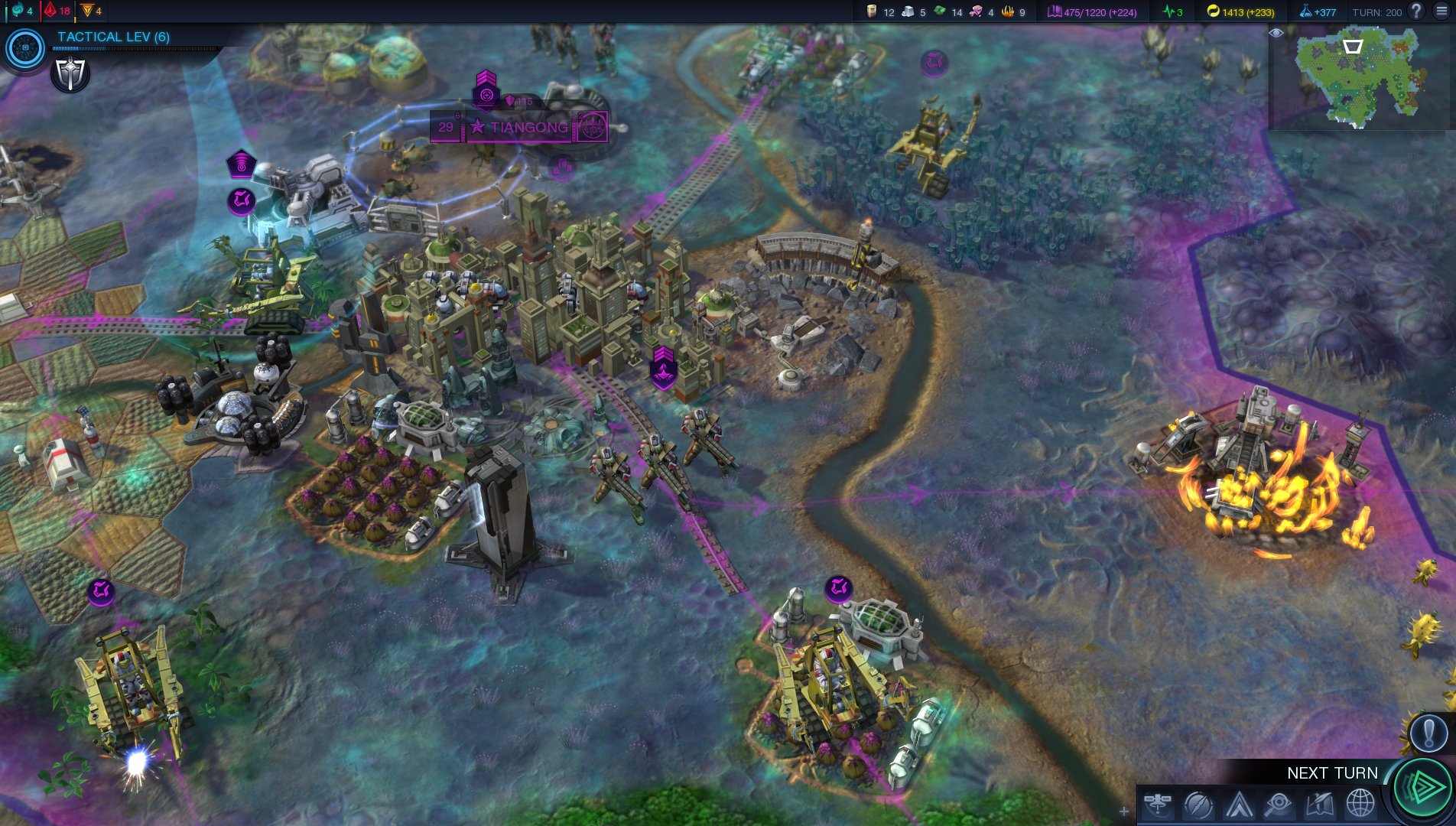Search
[{{{type}}}] {{{reason}}}
{{/data.error.root_cause}}{{{_source.title}}} {{#_source.showPrice}} {{{_source.displayPrice}}} {{/_source.showPrice}}
{{#_source.showLink}} {{/_source.showLink}} {{#_source.showDate}}{{{_source.displayDate}}}
{{/_source.showDate}}{{{_source.description}}}
{{#_source.additionalInfo}}{{#_source.additionalFields}} {{#title}} {{{label}}}: {{{title}}} {{/title}} {{/_source.additionalFields}}
{{/_source.additionalInfo}}Sid Meier's Civilization: Beyond Earth (PC)

Sid Meier's Civilization: Beyond Earth
Developed by: Firaxis Games
Published by: 2K
Release Date: 23 Oct, 2014
Available on: PC, Mac, Linux
Genre: Strategy
Number of Players: 1-8
ESRB Rating: E10+
Price: 50e/50$
Sid Meier is one of the most prominent figures in the modern gaming industry. Sid and his company Firaxis are famous for such notable franchises or games as Pirates!, Civilization (Civ), Colonization, Alpha Centauri, and the rather recent modernization of the 90s classic UFO Enemy Unknown (UFO, also known as XCom). Naturally, fans of his Civilization games and the sci-fi version Alpha Centauri were extremely hyped over the announcement and the promising trailer of Civilization: Beyond Earth, a sequel hybrid to Civilization and Alpha Centauri. Firaxis is known for creating quality games that try to have enough complexity to appeal to the hardcore strategists, but that are still capable of creating an experience that does not repel the more casual gamers. As such, Civilization: Beyond Earth was pretty much guaranteed to be one of the most important strategy game releases of 2014.
Creating a modernization of an old classic can be difficult. Some fans were puzzled over the streamlining of tactical combat in modern UFO, but the overall consensus did agree that the modernization of UFO created a good game somewhat loyal to its ancestor while also adding enough content to create its own unique experience. Similarly, Civilization: Beyond Earth tries to fulfill the expectations of new and old fans of the 1999 classic Sid Meier's Alpha Centauri. As such, Beyond Earth can be a tough game to approach. Is it a Civilization game? Although the name does imply that, Beyond Earth suggests a somewhat different game, as the traditional Civ-games are based on Earth's history. Is it a modernization of Alpha Centauri then? Possibly, but Alpha Centauri felt very different in comparison to the Civilization games of the time, thus it is weird to tag along the name of the Civilization franchise.
The first impression of Beyond Earth does have Civilization V written all over it. All the graphical interfaces and fundamental game mechanics are directly adapted from Civ V, and the engine remains the same. Due to the vast amount of similarities between Beyond Earth and the Civilization Series, it is feasible to compare Beyond Earth and Civilization V hand-to-hand. The basic idea in both games is to wrestle for control over a hex-based map, which consists of both land and sea tiles. Units are separated to both passive (Colonizer, Worker) and military (Land Melee, Land Ranged, Air, and Sea units). The hexes themselves depict different types of land such as forest, desert, or swamp, and can be occupied by a single military unit each. Furthermore, players can create new cities that spread cultural borders, which define the borders of a nation. The map is occupied by semi-hostile native lifeforms (aliens in Beyond Earth, barbarians in Civ V) and passive single-city nations (stations in Beyond Earth, city-states in Civ V).

Strong Points: Well established strategic gameplay
Weak Points: Simple revamp of Civilization V with little novel content
Moral Warnings: War and over the top sci-fi predictions about the future
Each player is given the control of a single nation that has just colonized its first new planet in a distant solar system. Problems arise as other nations arrive and a struggle over the resources and living space begins. Although in theory peaceful win conditions exist, it is typical for a Civilization game to involve fierce, long wars between nations that are neighbors. Three factions, called affinities, are introduced in Beyond Earth: Harmony, Purity, and Supremacy. These roughly translate in game mechanics to political ideologies of the older Civilization games (e.g. Order aka. Socialism, Autocracy, Freedom aka. Liberalism), which means that the affinities drive nations to like nations that have adopted the same affinity and disliking ones that chose differently. Harmony affinity seeks to connect peacefully to the alien planet, its natural habitants, and is given opportunity to create a hivemind symbiosis with the planet for a victory condition. Purity affinity roughly translates to preserving humans in their original form, with only mechanical devices and vehicles to enhance their capabilities. Lastly, Supremacy affinity encourages human enhancement through cybernetic implants, with an ultimate aim of refining mankind into a type of an artificial intelligence based consciousness. Although each of the 3 affinities comes with different winning conditions and specific unit enhancements, the differences between affinities are surprisingly mild and very little imbalance between nations will be created with this. In practice it feels like the affinities only change a few placeholder texts in randomly generated events and few minor statistics for units available for each nation.
There are a few new features that are missing from Beyond Earth's predecessors. Firstly, there is a whole new map layer called the orbital map, where players can deploy orbital satellites. These can be either aggressive (such as increasing defense/offensive bonuses and attacking enemy units in certain hexes) or defensive (terraforming the hex tile to one more favourable, removing hazardous miasma). This new map layer provides an interesting new concept to the game, although its final significance on the gameplay is only marginal. Secondly, while the technological advancement in previous Civilization games has been a constant-width tree type of a structure, in Beyond Earth the technological advancement is portraited by a web-type structure. However, this minor change does not really bring anything new to the table - in fact this new technology advancement structure feels more simplified than that of older Civilization games, as mankind does not go through certain eras (such as Ancestral era, Medieval era, Industrial era, etc) like in Civilization V. Thirdly, creation of military units has been altered. Instead of pre-defined units that are unlocked per researched technology, new tech gives opportunity to customize already existing troops to a new specialized format according to the player's chosen affinity. Overall, the novel concepts introduced in Beyond Earth in comparison to Civilization V are rather scarce.
Civilization V always catered to the player with educative and depthful quotes when new technology was researched. These included quotes from famous people (for example upon discovering Archeology the quote: "Those who cannot remember the past are condemned to repeat it" by George Santayana) or cultural and religious sources (for example upon discovering Pottery the quote: "Shall the clay say to him that fashioneth it, What makest thou?" in The Bible, Isaiah, 45:9). Civilization: Beyond Earth instead has invented quotes by the leaders of the fictional countries, which hardly feel immersive. For most part they feel filled with cliches about an over-optimistic view of the future; how science can magically redeem mankind, and the space frontier offers a fresh start. These quotes illustrate the emptiness in how Beyond Earth models mankind's history - it omits a huge chunk of cultural, religious and national heritage, and instead lumps up these to a few large civilizations that roughly model each continent from Earth. The result feels like a hollow shell built around a few vaguely modeled countries, that really have no differences and instead feel like placeholders in terms of country names or graphical themes.

Higher is better
(10/10 is perfect)
Game Score - 78%
Gameplay - 13/20
Graphics - 8/10
Sound - 9/10
Stability - 4/5
Controls - 5/5
Morality Score - 84%
Violence - 8/10
Language - 10/10
Sexual Content - 10/10
Occult/Supernatural - 8/10
Cultural/Moral/Ethical - 6/10
One subsequent issue in Beyond Earth's prediction about the future is its complete lack of spiritual themes, which ought to be underlined here due to the nature of this site. This as a whole is a somewhat natural outcome of the continuum from Civ IV, to Civ V, and now Civ Beyond Earth: while in Civ IV the religions were connected to the technologies and their respective time periods, Civ V further simplified the already naive system of religions. Every major religion in Civ V felt like a placeholder name for a religion that could be fully customized to suit the player's need. For example Protestantism and Hinduism could be effectively identical in the game, and held no resemblance to their real-life counterparts. Beyond Earth goes even beyond this, as it completely omits the possibility of a civilization's spiritual beliefs. What is left is a generalized illusion of what scientific advancement can provide for mankind. While the affinity mechanics attempt to capture differences in human cultures, these hardly create enough variation to make each game in Beyond Earth different and interesting. It hardly feels realistic to assume that mankind even theoretically could abolish its spiritual or religious beliefs upon stepping on a space ship.
While Civ V offered mechanics for great works of literature, art or music, Beyond Earth offers a random-generated quest system that fails to redeem the lack of the former. The great wonders, which typically in Civ-series depict real-world counterpieces such as the Pyramids or the Great Wall of China, also feel flavourless and unimaginary in Beyond Earth (for example the Resurrection Device or the Quantum Computer). As such, the name 'Civilization' in Civilization: Beyond Earth hardly does justice to the franchise, as it feels more of a bland, over-generalized, politically correct turn-based space strategy simulator. There are plenty of examples of how cultural and spiritual differences can be modeled in strategy games, for example in Paradox Interactive grand strategy game Europa Universalis IV, where the religions are given real-life weighting while retaining playability with all nations. For me Beyond Earth left a feeling, that the game designers were afraid to deviate from already well established design choices in Civ V, and thus created a soulless phantasm of a title that had the potential to be extremely good and original.
The above exemplifies the blandness in Beyond Earth. There is nothing especially interesting or motivating in it, as it basically comprises of a graphically revamped Civilization V, with few neat new features (such as Orbital Satellites) but simultaneously leaving out a lot of richness that was present in Civ V (for example no trading of luxury resources, no religions, or no real-life inspired cultural artifacts, and simplified diplomacy). Differences between nations and affinities are non-significant, the tech web does not feel like it would contribute to the flow of the game, and only the orbital map layer feels like something completely new and interesting.
Civilization: Beyond Earth is not a bad game. In fact, it is actually a pretty decent game. However, this all comes down to Civilization V being a good game to begin with, as Beyond Earth feels like a hastily compiled copy of it with a recycled theme. As such, I cannot recommend Civilization: Beyond Earth for anybody who has even relatively many hours put into the Civilization V. Even for new players to the series, I would encourage comparing the thematical suitability, and going for Beyond Earth only if the science fiction setting is a must. Even then new players will miss out on a lot of rich and immersive cultural content in Civilization V that made it a captivating game in the first place. I was hoping for a great fresh game when I preordered Civilization: Beyond Earth, but instead I was given Civ V in space with dumbed down features. As such, it is hardly worth its current rather steep price tag (50e/50$ at Steam).






